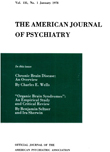Acupunctural Analgesia: Its Explanation by Conditioning Theory, Autogenic Training, and Hypnosis
Abstract
Acupunctural analgesia seems to work—but better for the Chinese than for other nationalities. Significant antecedent, intervening, and dependent variables indicate that the technique can best be understood within the paradigm of contemporary conditioning theory. It has not been placed in this framework because scientist-observers have not stressed the effects of shaping and modifying behavior by a kind of operant conditioning that brings about compliant behavior without the necessity for overt cooperation. This compliance can account for the broad spectrum of psychobiologic experiences leading to well-known placebo responses. Another factor not generally recognized is the powerful effect of suggestion, which enhances suggestibility and hypnotizability. The author also discusses the neuropsychophysiologic mechanisms involved in acupunctural analgesia.
Access content
To read the fulltext, please use one of the options below to sign in or purchase access.- Personal login
- Institutional Login
- Sign in via OpenAthens
- Register for access
-
Please login/register if you wish to pair your device and check access availability.
Not a subscriber?
PsychiatryOnline subscription options offer access to the DSM-5 library, books, journals, CME, and patient resources. This all-in-one virtual library provides psychiatrists and mental health professionals with key resources for diagnosis, treatment, research, and professional development.
Need more help? PsychiatryOnline Customer Service may be reached by emailing [email protected] or by calling 800-368-5777 (in the U.S.) or 703-907-7322 (outside the U.S.).



